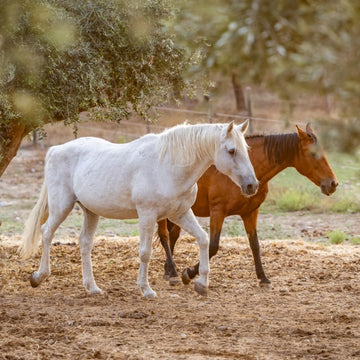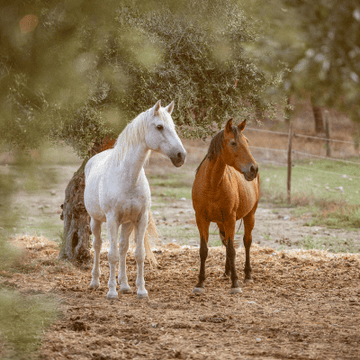In recent years, we have witnessed an increase in the average life expectancy of horses. This rise is partly due to the abandonment of the horse as a working animal and its growing use in sport and leisure, as well as the provision of better healthcare and a greater overall understanding of the species.
With this increase in age, new challenges have emerged—namely, in maintaining an adequate body condition. There are several factors that influence the maintenance of optimal body condition in senior horses.
Digestive Efficiency
In general, senior horses show a decrease in digestive efficiency.
The ability to absorb nutrients is limited by age-related changes in the intestinal epithelium, which reduces the passage of nutrients into the bloodstream.
Production of the enzyme amylase, which is essential for the digestion of starch, is also reduced. This impairs pre-cecal starch digestion, increasing the likelihood of starch reaching the large intestine and potentially leading to intestinal acidosis, which makes the horse more prone to colic and laminitis.
Protein digestion and absorption are also particularly compromised in senior horses, contributing to muscle loss.
For these reasons, a gastric supplement and/or a cereal-free concentrate feed may help support or complement the senior horse’s diet.
Poor Dentition
Tooth wear and/or loss associated with age negatively affect grasping, chewing, and salivation.
Inadequate chewing and salivation result in larger feed particles entering the intestinal tract, which hinders the action of digestive enzymes and microbiota, compromising digestive efficiency.
Forage-based complementary feeds and concentrated feeds can support or complement the diet of senior horses.
Stress / Illness
Stress factors such as temperature can have a significant impact on senior horses.
Cold weather is particularly challenging, as internal mechanisms for heat production—like fiber fermentation in the hindgut—may be limited. Cold temperatures can also reduce water intake, increasing the risk of dehydration and associated complications.
Changes in management can also affect body condition. For instance, during a transition to a group turnout system, social hierarchies may limit access to feed.
Chronic weight loss and the resulting decrease in body condition can also be linked to states of illness and/or chronic pain.
Infectious diseases, arthritis, kidney disorders, allergic or neoplastic conditions, among others, may explain persistent weight loss.

